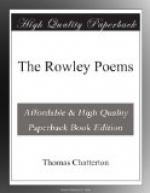SERVYTOURE.
AElla ys sleene; the flower of Englonde’s marrde!
AELLA.
Be stylle: swythe lette the chyrches rynge mie knelle.
Call hyther brave Coernyke; he, as warde
Of thys mie Brystowe castle, wyll doe welle.
[Knelle ryngeth.
AELLA, EGWINA, SERVYTOURE, COERNYKE.
AELLA.
Thee I ordeyne the warde;
so alle maie telle. 1200
I have botte lyttel tym to
dragge thys lyfe;
Mie lethal tale, alyche a
lethalle belle,
Dynne yn the eares of her
I wyschd mie wyfe!
Botte, ah! shee maie be fayre.
EGWINA.
Yatte shee moste bee.
AELLA.
Ah! saie notte foe; yatte worde woulde AElla dobblie flee. 1205
AELLA, EGWINA, SERVYTOURE, COERNYKE, BIRTHA, HURRA.
AELLA.
Ah! Birtha here!
BIRTHA.
Whatte dynne ys thys? whatte
menes yis leathalle knelle?
Where ys mie AElla? speeke;
where? howe ys hee?
Oh AElla! art thou yanne alyve
and welle!
AELLA.
I lyve yndeed; botte doe notte lyve for thee.
BIRTHA.
Whatte menes mie AElla?
AELLA.
Here mie meneynge
see. 1210
Thie foulness urged mie honde to gyve thys wounde,
Ytte mee unsprytes[128].
BIRTHA.
Ytte hathe unspryted mee.
AELLA.
Ah heavens! mie Birtha fallethe
to the grounde!
Botte yette I am a manne, and so wylle bee.
HURRA.
AElla! I amme a Dane; botte yette a friende to thee. 1215
Thys damoyselle I founde wythynne
a woode,
Strevynge fulle harde anenste
a burled swayne;
I sente hym myrynge ynne mie
compheeres blodde,
Celmonde hys name, chief of
thie warrynge trayne.
Yis damoiselle foughte to
be here agayne; 1220
The whyche, albeytte foemen,
wee dydd wylle;
So here wee broughte her wythe
you to remayne.
COERNIKE.
Yee nobylle Danes! wythe goulde I wyll you fylle.
AELLA.
Birtha, mie lyfe! mie love!
oh! she ys fayre.
Whatte faultes coulde Birtha have, whatte
faultes could AElla feare?
BIRTHA.
Amm I yenne thyne? I
cannotte blame thie feere.
Botte doe reste mee uponne
mie AElla’s breaste;
I wylle to thee bewryen the
woefulle gare.
Celmonde dyd comme to mee
at tyme of reste,
Wordeynge for mee to flie,
att your requeste, 1230
To Watchette towne, where
you deceasynge laie;
I wyth hym fledde; thro’
a murke wode we preste,
Where hee foule love unto
mie eares dyd saie;
The Danes—




